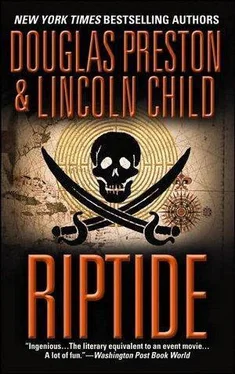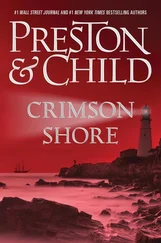Douglas Preston - Riptide
Здесь есть возможность читать онлайн «Douglas Preston - Riptide» весь текст электронной книги совершенно бесплатно (целиком полную версию без сокращений). В некоторых случаях можно слушать аудио, скачать через торрент в формате fb2 и присутствует краткое содержание. Жанр: Триллер, на английском языке. Описание произведения, (предисловие) а так же отзывы посетителей доступны на портале библиотеки ЛибКат.
- Название:Riptide
- Автор:
- Жанр:
- Год:неизвестен
- ISBN:нет данных
- Рейтинг книги:3 / 5. Голосов: 1
-
Избранное:Добавить в избранное
- Отзывы:
-
Ваша оценка:
- 60
- 1
- 2
- 3
- 4
- 5
Riptide: краткое содержание, описание и аннотация
Предлагаем к чтению аннотацию, описание, краткое содержание или предисловие (зависит от того, что написал сам автор книги «Riptide»). Если вы не нашли необходимую информацию о книге — напишите в комментариях, мы постараемся отыскать её.
Riptide — читать онлайн бесплатно полную книгу (весь текст) целиком
Ниже представлен текст книги, разбитый по страницам. Система сохранения места последней прочитанной страницы, позволяет с удобством читать онлайн бесплатно книгу «Riptide», без необходимости каждый раз заново искать на чём Вы остановились. Поставьте закладку, и сможете в любой момент перейти на страницу, на которой закончили чтение.
Интервал:
Закладка:
As Hatch opened his mouth to speak, Neidelman turned abruptly toward Magnusen. "Kill the pumps," he said.
In the descending silence that followed, Hatch could hear the groans and whispers of the Water Pit beneath them.
"Water level returning to normal, sir," Magnusen said without turning from her console.
"This is bullshit, man," Rankin muttered, snapping through sonar readings. "We sealed all five tunnels. This is going to be one hell of a problem."
Neidelman half turned his head at this, and Hatch could see the chiseled profile, the hard glitter in the eyes. "It's not a problem," he said in a low, strange voice. "We'll simply do what Macallan did. We'll cofferdam the shore."
Chapter 20
At quarter to ten that evening, Hatch emerged from the boarding hatch of the Cerberus and walked across the gangway to his own boat. At the end of the working day, he'd motored over to the big ship to inspect the CBC machine he'd be using if blood work was needed for any of the expedition members. While on board, he'd struck up a conversation with Thalassa's quartermaster, and in short order had been invited to stay for dinner in the ship's galley and to meet the half-dozen occupants. At last, full of vegetable lasagna and espresso, he'd said his farewells to the easygoing crewmen and lab technicians and headed back through the white corridors toward the exit hatch. Along the way, he'd passed the door to Wopner's stateroom. For a moment, he'd considered checking in with the programmer, but decided the unpleasant reception he was sure to get outweighed the benefits of a status report.
Now, back on the Plain Jane, he powered up the engine, cast off the lines, and pointed the boat into the warm night. The distant lights of the mainland were strung out across the dark, and a nearer cluster on Ragged Island glowed softly through the mantle of mist. Venus hung low over the western horizon, reflected in the water as a wavering thread of white. The motor ran a little roughly, but eased as Hatch moved the throttle forward. A glowing trail of phosphorescence sprang from the boat's stern: sparks swirling from a green fire. Hatch sighed contentedly, looking forward to the placid journey ahead despite the lateness of the hour.
Suddenly the roughness returned. Quickly, Hatch cut the motor and let the boat drift. Feels like water in the fuel line, he thought. With a sigh, he went forward for a flashlight and some tools, then returned to the cockpit and pulled up the deckpads, exposing the engine beneath. He licked the beam about, searching for the fuel-water separator. Locating it, he reached in and unscrewed the small bowl. Sure enough, it was full of dark liquid. Emptying it over the side, he bent forward again to replace it.
Then he stopped. In the silence left by the killing of his engine, Hatch could make out a sound, coming toward him out of the nocturnal stillness. He paused and listened, uncomprehending for a moment. Then he recognized it: a woman's voice, low and melodious, singing an enchanting aria. He stood up and turned involuntarily in the direction of the voice. It floated across the dark waves, bewitchingly out of place, ravishing in its note of sweet suffering.
Hatch waited, listening as if transfixed. As he looked across the expanse of water, he saw it was coming from the dark form of the Griffin, its running lights extinguished. A single point of red glowed out from Neidelman's vessel: through his binoculars he could see it was the Captain, smoking his pipe on the forward deck.
Hatch closed the deckpads, then tried the engine again. It sprang to life on the second crank, running sweet and clear. Hatch eased the throttle forward and, on an impulse, moved slowly toward the Griffin.
"Evening," said the Captain as he approached, the quiet voice unnaturally clear in the night air.
"And to you too," said Hatch, putting the Plain Jane into neutral. "I'd bet my eyeteeth that's Mozart, but I don't know the opera. The Marriage of Figaro, perhaps?"
The Captain shook his head. "It's 'Zeffiretti Lusinghieri.'"
"Ah. From Idomeneo."
"Yes. Sylvia McNair sings it beautifully, doesn't she? Are you a fan of opera?"
"My mother was. Every Saturday afternoon, the radio would fill our house with trios and tuttis. I've only learned to appreciate it these last five years or so."
There was a moment of silence. "Care to come aboard?" Neidelman asked suddenly.
Hatch tied the Plain Jane to the rail, killed the engine, and hopped over, the Captain giving him a hand up. There was a glow from the pipe, and Neidelman's face was briefly illuminated with a reddish aura, accentuating the hollows of his cheeks and eyes. A wink of precious metal shone from the pilothouse as the curl of gold reflected the moonlight.
They stood at the rail, silent, listening to the final dying notes of the aria. When it ended and the recitative began, Neidelman breathed deeply, then rapped out his dottle on the side of the boat. "Why haven't you ever asked me to quit smoking?" he asked. "Every doctor I've ever known has tried to get me to quit, except you."
Hatch considered this. "It seems to me I'd be wasting my breath."
Neidelman gave a soft laugh. "You know me well enough, then. Shall we go below for a glass of port?"
Hatch shot a surprised glance at the Captain. Just that night, in the galley of the Cerberus, he'd heard that nobody was ever invited below on the Griffin; that nobody, in fact, even knew what it looked like. The Captain, although personable and friendly with his crew, always kept his distance.
"Good thing I didn't start lecturing you on your vices, isn't it?" Hatch said. "Thanks, I'd love a glass of port."
He followed Neidelman into the pilothouse, then down the steps and under the low door. Another narrow half-flight of metal stairs, another door, and Hatch found himself in a large, low-ceilinged room. He looked around in wonder. The paneling was a rich, lustrous mahogany, carved in Georgian style and inlaid with mother-of-pearl. Delicate Tiffany stained glass was set into each porthole, and leather banquettes were placed against the walls. At the far end, a small fire glowed, filling the cabin with warmth and the faint, fragrant smell of birch. Glass-fronted library cabinets flanked either side of the mantelpiece; Hatch could see bound calfskin and the gleam of gold stamping. He moved forward to examine the titles: Hakluyt's Voyages, an early copy of Newton's Principia. Here and there, priceless illuminated manuscripts and other incunabula were arranged face outward; Hatch recognized a fine copy of Les Tres Riches Heures du Duc de Berry. There was also a small shelf devoted to original editions of early pirate texts: Lionel Wafer's Batchelor's Delight, Alexander Esquemelion's Bucaniers of America, and A General History of the Robberies and Murders of the most notorious Pyrates, by Charles Johnson. The library alone must have cost a small fortune. Hatch wondered if Neidelman had furnished the boat with earnings from prior salvages.
Beside one of the cabinets was a small seascape in a gilt frame. Hatch moved in for a closer look. Then he drew in his breath sharply.
"My God," he said. "This is a Turner, isn't it?"
Neidelman nodded. "It's a study for his painting, Squall Off Beachy Head, 1874"
"That's the one in the Tate?" Hatch said. "When I was in London a few years back, I tried sketching it several times."
"Are you a painter?" Neidelman asked.
"I'm a dabbler. Watercolors, mostly." Hatch stepped back, glancing around again. The other pictures that hung on the walls were not paintings, but precise copperplate engravings of botanical specimens: heavy flowers, odd grasses, exotic plants.
Читать дальшеИнтервал:
Закладка:
Похожие книги на «Riptide»
Представляем Вашему вниманию похожие книги на «Riptide» списком для выбора. Мы отобрали схожую по названию и смыслу литературу в надежде предоставить читателям больше вариантов отыскать новые, интересные, ещё непрочитанные произведения.
Обсуждение, отзывы о книге «Riptide» и просто собственные мнения читателей. Оставьте ваши комментарии, напишите, что Вы думаете о произведении, его смысле или главных героях. Укажите что конкретно понравилось, а что нет, и почему Вы так считаете.












